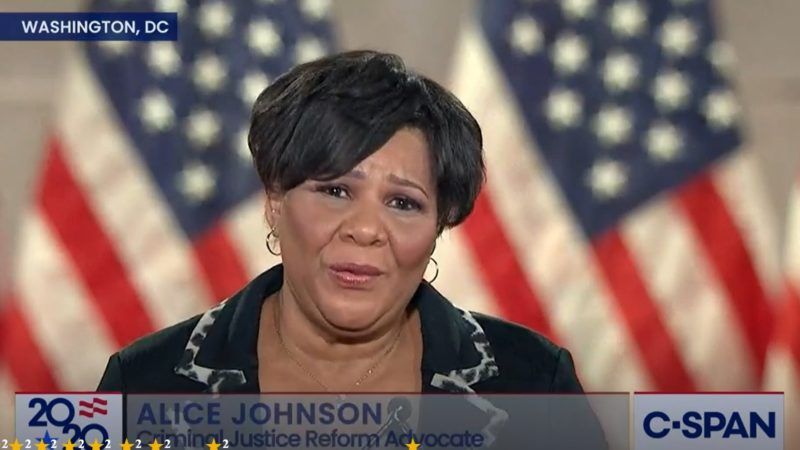Trump's Vague Commitment to Criminal Justice Reform
The president's daughter says "we’re just getting started." Some details would be nice.

Alice Johnson's appearance at the Republican National Convention last week was a rebuke to Democratic presidential nominee Joe Biden, who for decades promoted the draconian policies that sent her to prison for life as a first-time, nonviolent drug offender. Johnson's case was also meant to show that President Donald Trump, who commuted her sentence in 2018 and pardoned her the day after her speech, offers a more enlightened alternative.
The truth is a little more complicated. While Biden's record in office on criminal justice issues is long and awful, Trump's is short and pretty good. But when it comes to promises for the future, a repentant Biden supports several ambitious reforms, while Trump sounds like the Biden of the 1980s and '90s.
Johnson, who received a life sentence in 1997 for participating in a Memphis-based cocaine trafficking operation, was introduced during the president's State of the Union address last year, and she was featured in a Trump campaign Super Bowl ad last February. Her case exemplifies the unjust penalties that Biden—whom the Trump campaign describes, with only a little hyperbole, as "the chief architect of mass incarceration and the War on Drugs"—supported as a senator.
Trump seems to have been genuinely moved by Johnson's story, and so far he has commuted 10 sentences in addition to hers. By comparison, Barack Obama, who eventually commuted a record 1,715 sentences, approved just one petition during his first term.
The convention also highlighted Trump's support for the FIRST STEP Act, a 2018 law that included some modest but significant sentencing reforms. One of those provisions dealt with the irrational disparity between the smoked and snorted forms of cocaine, which was created by a 1986 law that Biden wrote.
More than two decades later, in the midst of his unsuccessful bid for the 2008 Democratic presidential nomination, Biden introduced a bill aimed at eliminating that distinction, which had led to strikingly unequal treatment of black defendants. While the bill went nowhere, Biden as vice president continued to advocate correction of what he last year described as "a big mistake" that had "trapped an entire generation."
The Fair Sentencing Act, which Obama signed in 2010, shrank but did not eliminate the gap between crack and cocaine powder, and it did not apply retroactively, meaning that thousands of prisoners continued to serve sentences that nearly everyone agreed were excessive. The FIRST STEP Act, which passed the House and the Senate with overwhelming support, addressed the latter problem; it also reduced sentences for repeat drug offenders, expanded "good time" credits, prevented the stacking of multiple firearm charges in a single drug case, and widened the "safety valve" that allows low-level, nonviolent offenders to avoid mandatory minimums.
Trump deserves credit for supporting that law, which has freed thousands of federal prisoners, and for using his clemency powers not only to help his cronies but to ameliorate some genuine injustices. Yet his campaign has nothing to say about further reforms, and his second-term agenda echoes the "tough on crime" Biden, calling for more police on the streets, opposing bail reform, and advocating harsher punishment without explaining why current penalties are inadequate.
Biden, meanwhile, claims to have seen the error of his ways. In addition to equalizing the sentences for crack and cocaine powder, he supports abolishing the myriad mandatory minimums and death penalties he once championed and decriminalizing pot possession, although he still resists repealing the federal ban on marijuana.
"Against all odds," the president's daughter said at the convention, Trump "brought together Republicans and Democrats, and passed the most significant criminal justice reform of our generation. And we're just getting started." That last part requires some explanation.
"My father did not campaign on this issue," Ivanka Trump added. "He tackled this injustice because he has a deep compassion for those who have been treated unfairly." While I am inclined to believe her, Trump needs to clarify the future implications of that impulse.
© Copyright 2020 by Creators Syndicate Inc.


Show Comments (48)